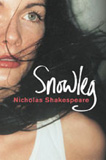 | Reviews of Snowleg by Nicholas Shakespeare. |
This book has been nominated for the 2006 IMPAC Dublin Literary Award, and was longlisted for the 2004 Man Booker Prize.
Description: "A young Englishman visits Cold War Leipzig with a group of students and, during his brief excursion behind the Iron Curtain, falls for an East German girl who is only just beginning to wake up to the way her society is governed. Her situation touches him, but he is too frightened to help. He spends decades convincing himself that he is not in love until one day, with Germany now reunited, he decides to go back and look for her. But who was she, how will his actions have affected her, and how will her find her? All he knows of her identity is the nickname he gave her - Snowleg."
David Robson's review in "The Telegraph": "Hard-bitten readers will probably find the novel impossibly schmaltzy and get exasperated by the love-sick hero. But Snowleg offers more than high romance: it is a portrait, and a good one, of the East Germany of the Stasi, with its bleakly beautiful landscapes, its casual betrayals, and its subtle capacity to dehumanise. In such a cold political climate, who can blame lovers for going slightly mad?"
Colin Greenland's review in "The Guardian": "Manic plot devices, literary tics and grammatical sprains not-withstanding, Snowleg is a considerable achievement: a dark, dense account of arrested development and mid-life crisis; a shrewd study of institutionalised paralysis and political psychosis; a humane perspective on the rusting away of the iron curtain. What's curious is that it's also a thoroughly conventional romance novel: a heart-warming tale of rich, enabling coincidence and conquering love; love without frontiers."
James Bradley's review in "The Age": "Shakespeare is a writer who is deeply concerned with the inner dimensions of our lives, of the moral choices that we make and the weight of those choices. For all the complexity of the book's plotting and its slightly dissociated prose, the questions Shakespeare wants to ask are profound ones about the precise ways in which repression deforms the spirit and about the extension of compassion to those so affected...Shakespeare has taken on a series of questions that resist easy or glib responses, questions that should make all of us uneasy, not just about the ease with which we condemn the actions of those who suffer under totalitarian regimes but about whether we ourselves might behave any better."
Wingate Packard's review in "The Seattle Times": "Snowleg is an admirably organic novel, well-seeded with richly idiosyncratic characterizations and finely evoked places (the dreary East German exteriors and interiors are wrenchingly pathetic). Snowleg is a delicious mystery, not only in genre but also in the ways that people separated by personal or public barriers carry on after life-altering schisms."
